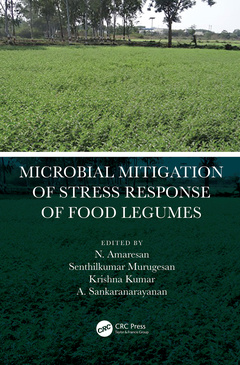Description
Microbial Mitigation of Stress Response of Food Legumes
Coordinators: Amaresan N., Murugesan Senthilkumar, Kumar Krishna, Sankaranarayanan A.
Language: English
Subjects for Microbial Mitigation of Stress Response of Food Legumes:
Keywords
Southern Bean Mosaic Virus; food legumes; Microbial Inoculants; microbial mitigation; Soil Fertility; leguminous microbiome; Salt Stress; microbe-mediated stress management; Abiotic Stresses; Salinity Stress; Mung Bean; Vigna Radiata; Pod Borers; PGPR; ISR; Plant Growth Promotion; Abiotic Stress Responses; BCA; Cry Toxin; Endophytic Fungus; PGPR Strain; Cry Proteins; Soilborne Diseases; Rhizobial Strains; Legume Pod Borer; Bt Toxin; CPMV; Mycorrhizal Fungi; Acc Deaminase
· 17.8x25.4 cm · Hardback
Description
/li>Contents
/li>Biography
/li>
Microbial Mitigation of Stress Responses of Food Legumes provides knowledge on the impact of abiotic and biotic stress on the agriculture of grain legumes especially pulses and it critically reviews the cutting-edge research in exploring plant microbe interactions to mitigate the stress. It helps in understanding the fundamentals of microbial-mediated management of abiotic and biotic stress in grain legumes.
Salient features:
Describes the usefulness of microbiome of plant/insects for enhancing the production of grain legumes
Focuses on recent advances in microbial methods for mitigating the stress and their application in sustainability of legume production
Provides a unique collection of microbial data for the improvement of legume productivity
Details microbial metabolites at the gene and molecule levels for plant stress management
The reader will get all essential and updated information on various stress factors, crop responses, and microbial-mediated stress management for better food legume production.
Section I Crop Responses and Microbe-Mediated
Stress Management: Legumes
1. Simulation of the Daily Exchange of Carbon and Nitrogen between
Microorganisms, Plant and Symbionts of Intercropped Legume
with Cereal in Mediterranean Agro Ecosystem ............................................................................ 3
2. Biotic and Abiotic Stress Responses of Domesticated Vigna Legumes:
A Comprehensive Review ...............................................................................................................11
3. Ecosystem Services of the Crop Wild Relatives, in Particular, Food Legume
Landraces-Rhizobia Association in Northern Africa and the Adaptation
of Their Genetic Material to Agronomic and Environmental Objectives ................................ 25
4. Role of Leguminous Microbiome in Plant Growth Promotion and Plant Protection ............. 39
5. Plant Growth-Promoting Bacteria Modulate Biotic and Abiotic Stress
Tolerance in Legumes .....................................................................................................................51
6. Symbiosis with Fungal Endophytes Conferring Stress Tolerance in Legumes ....................... 69
7. Multi-trait Trichoderma for Improving Plant Health of Grain Legumes ................................ 85
8. Effects of Pesticides and Heavy Metals on the Growth and Yield of Food
Legume Plants .............................................................................................................................. 103
Section II Crop Responses to Stress-Soybean
9. Biotic and Abiotic Stress Responses of Hyacinth Bean (Lablab purpureus)
and Soybean (Glycine max): A Mini-review ...............................................................................115
Section III Crop Responses and Microbe-Mediated
Stress Management: Groundnut
10. Biological Control of Soilborne Diseases and Water Stress Management
in Groundnut ................................................................................................................................ 123
Section IV Crop Responses to Microbe-Mediated
Abiotic Stress Management
11. Microbial Mitigation of Abiotic Stress Responses in Legumes ................................................141
12. Microbial Bioinoculants for Salt Stress Tolerance in Plants ....................................................155
13. Microbial Mitigation of Salinity and Water Stress in Legume Crops .....................................165
14. Plant Growth-Promoting Rhizobacteria (PGPR) for the Mitigation of Salt Stress
and Growth Promotion of Chickpea ...........................................................................................177
15. Contribution of Arbuscular Mycorrhizal Symbiosis to Salinity Tolerance
in Leguminous Plants ...................................................................................................................191
16. Microbial-Mediated Abiotic Stress Tolerance in Soybean Plants ........................................... 209
Section V Crop Responses to Microbe-Mediated Biotic
Stress Management
17. Bacterial Biological Control Agents for Soilborne Diseases Management in Pulses:
Present Status and Future Prospects ..........................................................................................231
18. Bacillus thuringiensis Cry Gene Mediated Biological Pest Management
in Grain Legumes ......................................................................................................................... 245
19. Structural and Functional Diversity of Cry Genes and Their Utilization
in Pest Management of Grain Legumes ..................................................................................... 257
20. Microbial Mitigation of Biotic Stresses in Soybean (Glycine max) ......................................... 271
Dr. N. Amaresan is an Assistant Professor at C.G. Bhakta Institute of Biotechnology, Uka Tarsadia University, Gujarat. He is basically a Microbiologist, obtained Ph.D., degree on endophytic PGP bacteria from Bharathidasan University, Tamil Nadu. Dr. N. Amaresan has over thirteen years of experience in teaching & research and made several original and novel discoveries, especially in various allied fields of microbiology mainly plant-microbe interactions, bioremediation, plant pathology and others. For his original discoveries on agriculturally important microorganisms he has been awarded young scientist awards by Association of Microbiologists of India and National Academy of Biological Sciences. He has also been awarded visiting scientist fellowship from National Academy of India to learn advanced techniques. He has handled two institute funded and four externally funded projects from DST, GEMI, DBT etc. He has published more than 50 research articles and books of national and international reputes. He also deposited over 350 bacterial 16S rDNA and fungal ITS rDNA sequences in the Genbank (NCBI, EMBL & DDBJ) and also preserved over 150 microbial germplasm in various culture collection centres of India.
Dr. Senthilkumar Murugesan is currently working as Principal Scientist (Microbiology) at ICAR-Indian Institute of Pulses Research, Kanpur. He obtained Ph.D (Microbiology) from Indian Agricultural Research Institute, New Delhi and received post-doctoral fellow from Korean Atomic Energy Research Institute, South Korea. He had twenty years of research experience on different aspects of plant-microbe interactions including symbiotic nitrogen fixation, biological control and microbial mediated abiotic stress management in pulses. He explored the diversity of endophytic bacteria from wild and cultivated soybean varieties for biological control of soybean charcoal rot disease. He purified anti-microbial pe




